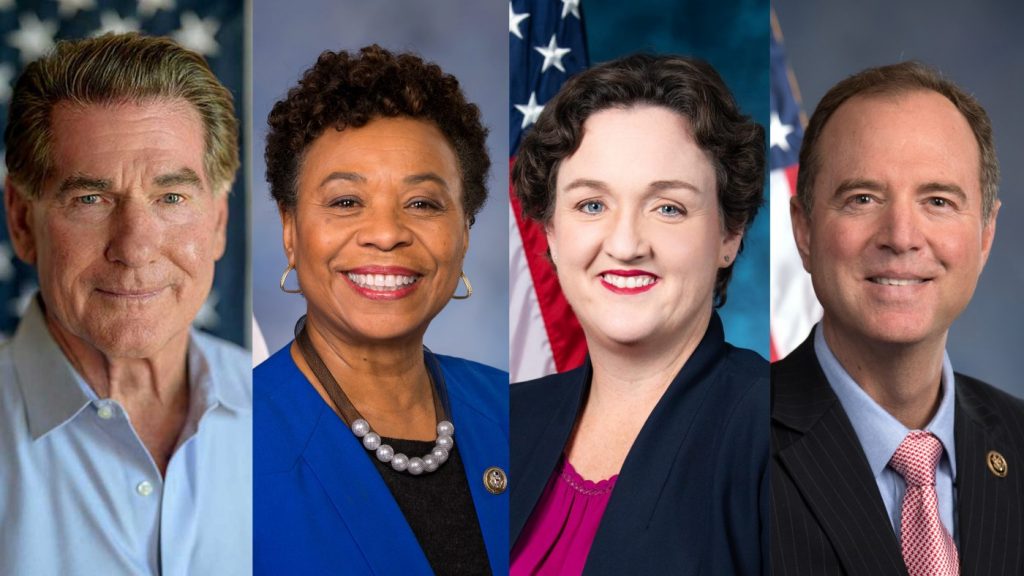While you-know-who is avoiding debates this political season, California voters will get to see the top four candidates for the Golden State’s coveted U.S. Senate on the same stage Monday night.
Get ready for the first of at least two debates in the race to succeed the late Sen. Dianne Feinstein, and the only one before ballots are mailed out Feb. 5 for the March 5 primary election.
Democratic Reps. Adam Schiff, Katie Porter and Barbara Lee and Republican former baseball star Steve Garvey will convene at the University of Southern California for the 6 p.m. debate moderated by Fox 11 News co-anchor Elex Michaelson and Politico senior reporter Melanie Mason.
And while Donald Trump has been noticeably absent in the many debates among GOP presidential hopefuls, the big focus on Monday night will be on how the Republican political novice Garvey fares against the three longtime Democratic politicians.
“It’s an open question whether he’s ready for prime time,” said David McCuan, a Sonoma State University political science professor.
Schiff has led the race in polls, but several now have put Garvey in second place. The top two vote-getters regardless of party advance to the November election.
Though Democrats enjoy a 2-1 party registration advantage in California, their votes are split among the three seasoned congressional representatives, while Garvey has risen quickly since his October entry to a race without well-known or financed Republicans.
Political analyst Dan Schnur, who teaches at USC, UC-Berkeley and Pepperdine, said that despite a Republican’s long odds for the seat in November, Garvey “might be the most important person on the debate stage.”
“There aren’t nearly enough Republicans in California to elect a candidate to statewide office, but there are just enough to put him in the runoff,” Schnur said. “Up until now, Katie Porter and Barbara Lee were both aiming for a second-place finish in the primary to get a one-on-one against Adam Schiff in the runoff. But if Garvey can consolidate the GOP vote, neither of them might get that chance.”
So how does that play out in the debate dynamics?
With Schiff, of Burbank, leading the polls and fundraising, it’s his race to lose.
“I think it matters a lot for everyone but Adam Schiff,” said Thad Kousser, a political science professor at the University of California-San Diego. “He’s got the money to go directly to voters.”
In that sense, McCuan said, Schiff needs “to understand questions that can become ‘gotcha’ moments and tread carefully around them, and show he’s the serious adult in the race who deserves attention.”
And Kousser added that for Schiff, the ideal outcome is that Garvey takes second in the primary. So it would make sense for Schiff to tie Garvey to Trump, the Republican presidential frontrunner who’s increasingly popular among California Republicans but viewed unfavorably 2-1 statewide.
For the other three contenders, it’s a battle for the number two spot in the primary.
“It will be interesting to see who Porter and Lee go after: Schiff, Garvey or each other,” Schnur said, “and whether Garvey positions himself as Arnold Schwarzenegger, Kevin McCarthy or Larry Elder” — California’s moderate last Republican governor, its recently ousted former GOP House speaker and the conservative radio host, respectively.
For Garvey, whose baseball stardom dates back to Ronald Reagan’s presidency, the debate is a chance to reintroduce himself to voters beyond the former Los Angeles Dodgers and San Diego Padres first baseman’s Southern California orbit as a viable contender.
“But there are real risks if he doesn’t have a compelling political vision, if he can’t connect his biography, can’t articulate how his career in baseball would translate in the Senate,” Kousser said. “He could fall just as dramatically as he’s risen.”
Reps. Porter of Irvine and Lee of Oakland, who appeal more to the Democrats’ progressive voters, are both battling for their congressional careers, Kousser said, as at least one if not both could be eliminated in March.
Related Articles
This California congressional district could help decide control of Congress
Morgan Hill is one of the last South Bay cities without term limits for elected officials. But that may be about to change.
How misinformation will impact the Latino community ahead of 2024 elections
Republican former baseball star Steve Garvey brings U.S. Senate campaign to Bay Area
New Hampshire primary: What you need to know
“If one of them can become the clear choice of progressives, they have a great shot not only in March but also in November,” Kousser said. “There are dangers to bashing Democratic opponents in a three-way race. They can be negative about Steve Garvey, Donald Trump. But they need to make the case for a progressive.”
Lee has trailed the other top rivals in polls but remains popular among many progressives. She’s also the only Black woman in the race for a seat now occupied by Gov. Gavin Newsom’s appointee Laphonza Butler, the only Black woman now serving in the Senate. Butler is not running for a full term.
“Can Barbara Lee get any traction?” McCuan asked, noting that “she needs Democratic activist voters” to show up for her and vote.
Porter, first elected to Congress in 2018, is now squeezed between fellow Democrats Schiff, first elected in 2000, and Lee, elected to the House in 1998, and Republican Garvey, putting a second-place finish for her in jeopardy. Her fundraising pitches have noted the threat from Garvey while touting herself as the only candidate not taking money from corporate political committees or lobbyists.
“I imagine we’ll see some sizzle and comments from Katie Porter,” McCuan said, as she tries to shake things up.
The top four will get another chance to tangle before the election: A second debate is scheduled for Feb. 12 — shortly after ballots land in mailboxes — in San Francisco.
How to watch the U.S. Senate race debate
The debate will be broadcast live, commercial-free in the Bay Area from 6 p.m. to 7:30 p.m. on Fox 2 (KTVU) and will be livestreamed on FOXLA.com, POLITICO.com, and the Facebook page of the USC Dornsife Center for the Political Future.


